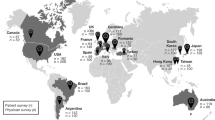Abstract
Background: The Australian Rheumatology Association Database (ARAD) is a voluntary national registry for monitoring the long-term benefits and safety of biological disease-modifying anti-rheumatic drugs (bDMARDs) for inflammatory arthritis. Both rheumatologists and patients contribute data to the ARAD.
Objective: To evaluate the satisfaction of patients and rheumatologists with the ARAD.
Methods: Cross-sectional surveys were distributed to a random sample of 100 community-dwelling ARAD patients in 2007 and to rheumatologists attending the 2007 Australian Rheumatology Association (ARA) annual scientific meeting.
Survey questions included items about the usefulness of the ARAD, workload for participants, frequency of questionnaires, and experience of contact with ARAD staff.
Results: A total of 92.5% of patients perceived the ARAD as very important (scoring 9–10 on a numeric rating scale). Patients reported minimal difficulty in completing questionnaires, and 95.0% indicated that a 6-month interval between questionnaires was reasonable. Of responding rheumatologists, 32.3%, 62.1%, and 53.8% indicated that the ARAD was very important (scoring 8–10) with respect to clinical information, research, and the profession, respectively, while 68% of those participating in the ARAD reported that the workload required to enroll patients was manageable and 30% found it difficult or onerous.
Conclusion: Key stakeholders in the ARAD view it as an important resource and are satisfied with its operations. Efforts will be directed towards assisting those rheumatologists who find the associated workload difficult and to improving the perceived clinical value of information available from the ARAD.





Similar content being viewed by others
References
Moreland LW, Schiff MH, Baumgartner SW, et al. Etanercept therapy in rheumatoid arthritis: a randomized, controlled trial. Ann Int Med 1999; 130(6): 478–86
Maini R, St Clair EW, Breedveld F, et al. Infliximab (chimeric anti-tumour necrosis factor alpha monoclonal antibody) versus placebo in rheumatoid arthritis patients receiving concomitant methotrexate: a randomised phase III trial. Lancet 1999; 354(9194): 1932–9
Weinblatt ME, Keystone EC, Furst DE, et al. Adalimumab, a fully human anti-tumor necrosis factor alpha monoclonal antibody, for the treatment of rheumatoid arthritis in patients taking concomitant methotrexate: the ARMADA trial [published erratum appears in Arthritis Rheum 2003; 48 (3): 855]. Arthritis Rheum 2003; 48(1): 35–45
Cohen S, Hurd E, Cush J, et al. Treatment of rheumatoid arthritis with anakinra, a recombinant human interleukin-1 receptor antagonist, in combination with methotrexate: results of a twenty-four-week, multicenter, randomized, double-blind, placebo-controlled trial. Arthritis Rheum 2002; 46(3): 614–24
Buchbinder R, March L, Lassere M, et al. Impact of treatment with biological agents for arthritis in Australia: the Australian Rheumatology Association Database (ARAD). Int Med J 2007; 37(9): 591–600
Sokka T, Pincus T. Eligibility of patients in routine care for major clinical trials of anti-tumor necrosis factor alpha agents in rheumatoid arthritis. Arthritis Rheum 2003; 48(2): 313–8
Briggs AM, March L, Lassere M, et al. Evaluation of selection bias in the Australian Rheumatology Association Database (ARAD) [poster]. Intern Med J 2007; 37(Suppl. 2): A38
Tinelli M, Bond C, Blenkinsopp A, et al. Patient evaluation of a community pharmacy medications management service. Ann Pharmacother 2007; 41(12): 1962–70
Kay LJ, Griffiths ID, BSR Biologics Register Management Committee. UK consultant rheumatologists’ access to biological agents and views on the BSR Biologics Register. Rheumatology (Oxford) 2006; 45(11): 1376–9
Hassol A, Walker JM, Kidder D, et al. Patient experiences and attitudes about access to a patient electronic health care record and linked Web messaging. J Am Med Inform Assoc 2004; 11(6): 505–13
Ralston JD, Carrell D, Reid R, et al. Patient web services integrated with a shared medical record: patient use and satisfaction. J Am Med Inform Assoc 2007; 14(6): 798–806
MacLellan D, Bradley D, Brimacombe M. Stakeholder evaluation of a high-risk prenatal nutrition intervention program in Prince Edward Island. Can J Dietetic Prac Res 2001; 62(4): 182–7
Brunner RL, Larson TA, Scott BJ, et al. Evaluation of the impact and acceptance of a nutrition program in an HIV community clinic. Aids Patient Care STDs 2001; 15(10): 533–43
Josephson T, Magee C, Alberts G, et al. Stakeholder satisfaction with a residentially-based child and youth care facility. J Child Youth Care 1992; 7: 1–10
Langford PH, Phillips D. Antecedents of community stakeholder satisfaction towards an Australian drug clinic. Drugs-Ed Prev Policy 2002; 9(4): 345–53
Carmona L, Descalzo MA, Perez-Pampin E, et al. All cause and cause-specific mortality in rheumatoid arthritis are not greater than expected when treated with TNF antagonists. Ann Rheum Dis 2007; 66(7): 880–5
Wolfe F, Mitchell D, Sibley J, et al. The mortality of rheumatoid arthritis. Arthritis Rheum 1994; 37(4): 481–94
Boyd IW. The role of the Australian Adverse Drug Reactions Advisory Committee (ADRAC) in monitoring drug safety. Toxicology 2002; 181: 99–102
Fontanarosa PB, Rennie D, DeAngelis CD. Postmarketing surveillance: lack of vigilance, lack of trust. JAMA 2004; 292(21): 2647–50
The authors are grateful to the rheumatologists and ARAD participants who responded to the surveys and all members of the ARAD project team (Molly Bond, Chris Reid, Margaret Staples, Robyn Middleton, John Oldroyd) and the ARAD Scientific Advisory Committee. The ARAD is supported by an NHMRC Enabling Grant 384330 (2006–2010), Monash University (2006–2010), and unrestricted grants from Abbott (2003–2006), Amgen (2003–2007), Aventis (2003–2004), Roche (2008), Schering Plough (2003–2004), and Wyeth (2003–2006) paid to the ARA. Infrastructure resources for ARAD are provided by Cabrini Health, Royal North Shore Hospital, and St George Hospital. Andrew Briggs is supported by an NHMRC Postdoctoral Fellowship and Rachelle Buchbinder is partially supported by an NHMRC Practitioner Fellowship. The authors are also grateful to staff at the BSRBR who provided copies of their 2006 survey.
Dr Andrew Briggs was project manager for the ARAD at the time the survey data were collected.
Author information
Authors and Affiliations
Corresponding author
Rights and permissions
About this article
Cite this article
Briggs, A.M., March, L., van den Haak, R. et al. Stakeholder Satisfaction with the Australian Rheumatology Association Database (ARAD). Patient-Patient-Centered-Outcome-Res 2, 61–68 (2009). https://doi.org/10.2165/01312067-200902010-00007
Published:
Issue Date:
DOI: https://doi.org/10.2165/01312067-200902010-00007




